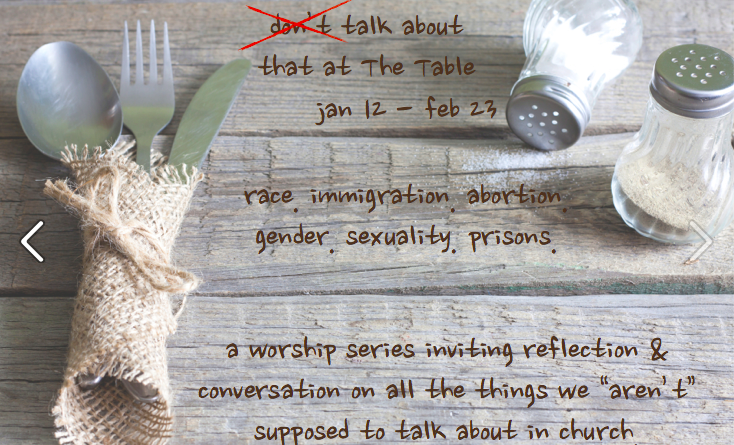Outline
January 12: United Methodist Social Principles (Acts 10.34-43)
January 19: Race (Matthew 5.38-48)
January 26: Immigration (1 Corinthians 1.10-18)
February 2: Abortion (Micah 6.1-8)
February 9: Gender (Ephesians 5.22-24 & Galatians 3.28)
February 16: Sexuality (Romans 1.26-27 & Ruth 1.16-17)
February 23: Prisons (Hebrews 13.3)
We continue our worship series, Don’t Talk About That at The Table; with reflection this coming week on sexuality.
We will invite deeper reflection on sexuality and faith. The United Methodist Social Principles includes this statement, ¶ 161.F We affirm that sexuality is God’s good gift to all persons. We call everyone to responsible stewardship of this sacred gift. Although all persons are sexual beings whether or not they are married, sexual relations are affirmed only with the covenant of monogamous, heterosexual marriage.
We deplore all forms of the commercialization, abuse, and exploitation of sex. We call for strict global enforcement of laws prohibiting the sexual exploitation of children and for adequate protection, guidance, and counseling for abused children. All persons, regardless of age, gender, marital status, or sexual orientation, are entitled to have their human and civil rights en-sured and to be protected against violence. The Church should support the family in providing age-appropriate education regarding sexuality to children, youth, and adults.
We affirm that all persons are individuals of sacred worth, created in the image of God. All persons need the ministry of the Church in their struggles for human fulfillment, as well as the spiritual and emotional care of a fellowship that enables reconciling relationships with God, with others, and with self. The United Methodist Church does not condone the practice of homosexuality and considers this practice incompatible with Christian teaching. We affirm that God’s grace is available to all. We will seek to live together in Christian community, welcoming, forgiving, and loving one another, as Christ has loved and accepted us. We implore families and churches not to reject or condemn lesbian and gay members and friends. We commit ourselves to be in ministry for and with all persons.
What feelings, memories, and responses emerge for you in reading this statement?
How do you respond to the very different ways these two biblical texts appear to address same gender loving relationships?


0 Comments